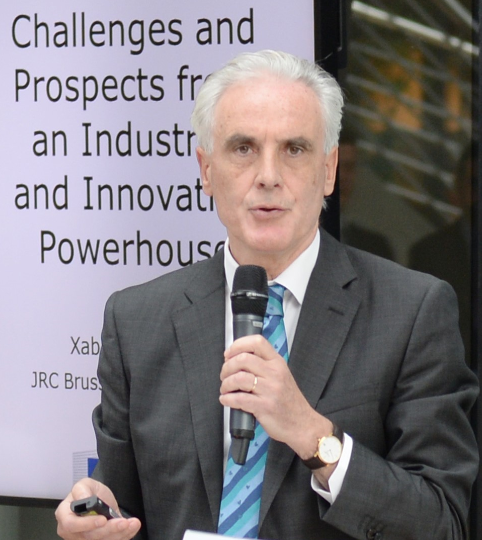Goodbye from Xabier Goenaga, Head of the Innovation Policies and Economic Impact Unit at the Joint Research Centre

date: 19/09/2023
Dear valued readers of the S3 Newsletter,
I stand at the crossroads of a new phase in my personal journey, just a stone's throw away from retirement after 33 years serving the European project with a focus on research for innovation policy and sustainable competitiveness.
From this vantage point, I look back with immense gratitude to the multitude of extraordinary individuals I have had the privilege to collaborate with in shaping EU R&I, Industrial and Cohesion policies. In the last 3 years of my tenure, I have been honoured to collaborate on place-based innovation policies with other European Commission Directorates General, as well as with other EU institutions, namely the European Committee of the Regions and the European Parliament. I have had the pleasure to work with world-class researchers to strengthen the evidence base and keep designing better policies and, last but not least, I have kept learning from the very stakeholders who breathe life into our efforts for place-based policies: all of you, the representatives of national, regional, and local authorities.
Among the accomplishments that stand out in this journey, I want to mention the joint effort with DG REGIO to define a methodology for the assessment of the fulfilment criteria for the enabling condition “Good governance of national or regional smart specialisation strategy” for the current wave of S3, following years of collaboration in the implementation of S3 including through the creation of the S3 Platform and this newsletter.
Our relentless dedication to streamlining support for territories implementing S3 has been a driving force for evolution and change. DG REGIO has set in place the S3 Community of Practice, where all information and interaction concerning S3 in the EU will gradually move, whereas this Newsletter and the S3 Platform will remain focused on the take up of the smart specialisation concept beyond the EU, and will progressively grow as a repository information on place-based transformative innovation for sustainability disseminating the findings of our research in this field.
Based on more of a decade of work on S3, two years ago we started asking how innovation policies should evolve to speed up the transition to digital and sustainable futures. We have investigated what can add strategic directionality to governance framework, how to open up the entrepreneurial discovery process to a wider range of stakeholders and to citizens, and we have underlined that there is no magic recipe, but a complex mix of policies and actions that need being set in place to create thriving innovation ecosystems. The Partnerships for Regional Innovation (PRI) pilot action has been a first milestone in our journey towards promoting a transformative placed based approach to policies in the EU.
Let me be clear, PRI is not a new policy concept. It is a systematic approach to re-think policy making rooted in 30 years of research in transformative innovation policy. Its role is not to establish new criteria to access funds, but to mainstream a new way to address wicked problems and promote systemic change by mixing different policy initiatives and funding instruments working across policy areas, across government departments and levels, and across territorial boundaries.
Working hand-in-hand with the European Committee of the Regions, under the research guidance of the Scientific Committee, and with the buy-in of 74 voluntary territories, we have showcased the importance of partnerships among different actors and diverse territories to address today's global challenges from a place-based perspective. We have also tested the attractiveness of this approach for EU cities, counties, regions and Member States. Through the PRI pilot action that has seen many of you involved, we have identified a space for Cohesion Policy to adopt a mission-oriented approach, steering effort at territorial level in the direction of more sustainable futures. I am sure that with the support of the European Parliament, the building blocks of PRI will be further operationalised to ensure that every territory can use them to shape their unique transition pathway.
In this journey we are working to support DG RTD in implementing the Regional Innovation Valley initiative under the HE programme. This is yet another sign that we are moving towards challenge-led policy support.
Lastly, I want to point you at the significant involvement of JRC in two upcoming events: the closing event of the Science Meets Regions Preparatory Action “Advancing Evidence for Policy at Local and Regional Level” and the European Week of Region and Cities, both underscore our commitment to evidence-based decision-making. I encourage you to follow our sessions in presence or online.
As we continue to forge ahead, we remain dedicated to reinforcing the analytical backbone that underpins EU R&I and Cohesion policies. This commitment to rigorous analysis will keep ensuring that our policies are grounded in robust evidence.
As I bid adieu to this rewarding role, I am pleased to introduce Carlos Torrecilla Salinas, as Head of Unit of JRC B7 “Innovation Policies and Economic Impact” who will be stepping into my shoes, with the support of Margherita Bacigalupo as Deputy Head of Unit. Carlos brings a wealth of experience and a fresh perspective to the table, and I am confident that under his leadership, JRC work on place-based transformative innovation policy for sustainability will reach new heights. I wish him the same sense of purpose that working for you and with you has given me in this last leg of my career in the European Commission.
Thanking you for your contributions along these years, I look forward to witnessing the continued growth of new governance models based on scientific evidence and on co-creation processes built on collaboration around shared objectives.
For those of you who want to remain in touch, my personal email address is goenaga.tantelu@mail.com
